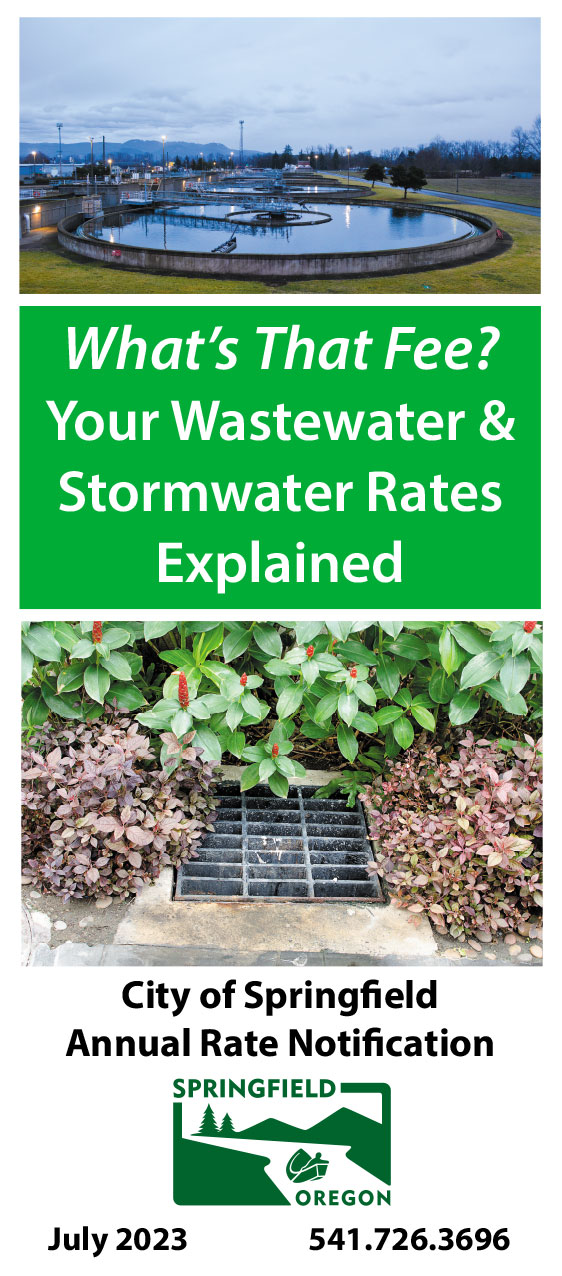Wastewater & Stormwater User Fees and My Bill
Your wastewater and stormwater fees are included in the bill you receive from Springfield Utility Board (SUB). If you have questions regarding the wastewater or stormwater portion of your bill please call 541.726.3696. If you have questions regarding your overall bill, or the water or electricity portion of your bill, please call SUB at 541.744.3795.
For more information view the current wastewater and stormwater rate brochure (effective July 1, 2022).
Frequently Asked Questions:
Your bill is a combined fee which includes a Metropolitan Wastewater Management Commission (MWMC) charge plus a flow-based fee. The flow portion of your wastewater bill is based on units of water consumed. One unit equals 748 gallons. The flow-based fees are determined from actual water meter readings during the winter months (December through April). For May through November, the bills are based on the average of the winter usage or the actual usage, whichever is less. For single-family-dwelling accounts with fewer than three months’ usage, bills are based on seven (7) units or actual usage, whichever is less.
The wastewater fees you pay go to build, operate, and maintain Springfield’s wastewater collection system and MWMC’s regional wastewater conveyance and treatment system. All wastewater must be collected and treated to meet state and federal water quality standards before it is discharged into the Willamette River.
- Inspect 224 miles of Springfield wastewater lines.
- Repair or replace approximately 40,000 feet of Springfield wastewater lines.
- Operate and maintain 49 local pump stations.
- Treat more than 13 billion gallons of wastewater per year.
- Process 2,000-3,000 dry tons of biosolids.
- Conduct 29,000 water quality tests per year. That’s more than 79 tests per day!
- Implement a federally-required industrial pretreatment and pollution prevention program.
- Construct new facilities. Click here to view the MWMC’s current and past projects.
Stormwater charges are assessed on all properties in the City of Springfield (Springfield Code 4.204). Rates are adjusted every year. Effective in July 2023, the Springfield City Council approved a 3% rate adjustment to fund stormwater capital projects and programs.
Residential rates
These rates set by Springfield City Council and are a flat monthly fee for all residential properties within City Limits.
Commercial rates
These are dependent on the amount of impervious (hard) surfaces relative to the size of the tax lot. Impervious surfaces include the building itself, parking lots, and gravel. Commercial rates have four categories ranging from light to very heavy, depending on how much impervious surface.
Stormwater fees are necessary to fund Springfield’s federally required stormwater management program, which includes:
- Cleaning and maintaining 200 miles of stormwater pipelines.
- Cleaning 6,500 storm drain basins, which keeps 100 tons of sediment and pollutants out of local waterways.
- Sweeping 6,000 miles of paved streets, removing 1,000 tons of street debris.
- Collecting 200 tons of leaves through the Leaf Pickup Program.
- Maintaining stormwater features (includes ditches, ponds, swales, wetlands, etc.)
- Planting native vegetation and removing invasive species along public waterways, and providing equipment to community groups doing the same.
- Establishing codes to protect riparian and wetland areas, which improve waterway health.
- Addressing illegal stormwater pollution.
- Providing public education to prevent stormwater pollution (required by the federal and state law).
The cost of sending clean water to a customer is considerably less than cleaning and purifying water discharged into the wastewater system so that it can be returned to the Willamette River.
There are several ways to check your plumbing for a leak.
The most common leak we see is a silent toilet leak. To check for one, put a few drops of food coloring into the tank of the toilet and wait several minutes. If the color seeps into the bowl, you have a leak.
Another good way to check if you have a leak is to make sure no one in the building is using any water and locate your meter. Most meters today have a flow detector on them: a small red triangle inside a bubble located under the numbers on the meter. When you are using water, the triangle spins. If you are not running anything that uses water and the triangle is spinning, you probably have a leak. Alternately, if you don’t know where your meter is located, you can call your water utility to ask them to check for you.
If you know you have a leak and don’t know where it’s located, consider hiring a leak detection service before contacting a plumber. They have specialized equipment to assist in locating the leak easily.

